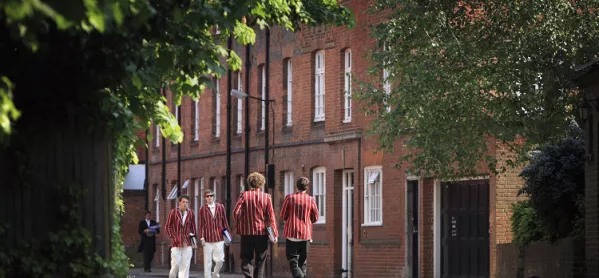The education secretary will today say he wants to “call time” on the phrase “public-school confidence” by making sure all children can develop such self-belief.
Damian Hinds will say that all pupils should be able to access activities based on “five foundations for building character”, including sport and volunteering.
Mr Hinds is expected address the Church of England Foundation for Educational Leadership conference in London this morning.
In his speech, he will say that character and resilience can be as important as GCSEs in helping young people to get on in life, but that children from poorer backgrounds have less access to such activities than their richer peers.
Need to know: Character education
Read: Can traits like ‘grit’ be taught?
Read: Damian Hinds’ priorities...on two sides of A4
Mr Hinds is expected to declare he is calling time on the phrase “public-school confidence”, arguing that such confidence should not be the preserve of privately educated children alone.
The ‘five foundations to build character’
He will say: “I want to make sure every child gets to build up their character and resilience by testing themselves from a range of enjoyable activities.
“These activities don’t have to be a result of a physical exertion. They can just as easily be something you do at school or at home or in an office or that isn’t a hobby.
“I am proposing the five foundations for building character, broad areas of activity that will help to develop character and resilience in young people. All of them combine elements that will stretch and challenge and will help young people to think, develop and grow, and that will enhance their self-esteem and confidence. This is a distillation of what I have heard repeatedly from teachers, parents, children.”
The DfE said the five foundations are:
- Sport - including competitive sport and other activities, such as running, martial arts and swimming, and purposeful recreational activities, such as rock climbing, hiking, orienteering, gym programmes, yoga or learning to ride a bike.
- Creativity - covering all creative activities including coding, arts and crafts, writing, graphic design, film-making and music composition.
- Performing - including dance, theatre and drama, musical performance, choir, debating or public speaking.
- Volunteering and membership - bringing together teams to take practical action in the service of others or groups, such as volunteering, getting involved in litter-picking, fundraising, any structured youth programmes or uniformed groups like Beavers, Brownies, Cubs, Guides, Scouts, cadets and the Duke of Edinburgh’s Award scheme.
- World of work - practical experience of the world of work, work experience or entrepreneurship. For primary-age children, this may involve opportunities to meet role models from different jobs.
Mr Hinds will promise to improve the sharing of information between organisations and schools about how to access these activities.
“We need greater coordination to increase awareness of all the opportunities available,” he will say. “I want to make clear that I’m not piling on the extra chores to a school’s to-do list. What I’m asking for is a joined-up effort from the entire community.
“We all have a vested interest in making sure that young people are resilient, resourceful and confident in their abilities. It’s not something that we can subcontract to schools.”




